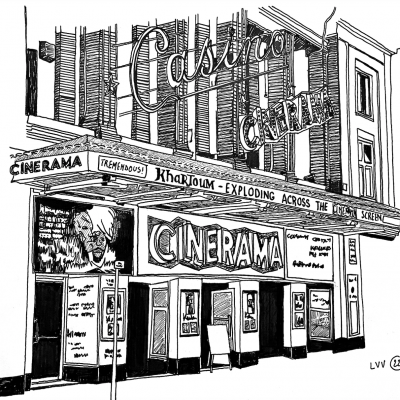
Hosted by TecnoCampus Mataró (affiliated to Pompeu Fabra University)
CFP: “Openings: Rethinking Centres and Peripheries in Historical Research about Moviegoing, Exhibition and Reception”
Deadline for proposals: 22 January 2023
Letters of acceptance/rejection: 6 February 2023
Keynote Speaker: Prof. Laura Fair, Columbia University, Middle Eastern, South Asian, and African Studies
The HoMER Network invites submissions for 20-minute papers, as well as designated roundtables, panels, and workshops to be presented at the conference.
We welcome papers from researchers across the academic spectrum as well as interdisciplinary work and encourage papers from postgraduate researchers and early career researchers.
The 2022 Homer conference in Rome opened with a keynote exploring the golden age of cinema audiences in Latin America and what prof. Ana Rosas Mantecón called “peripheral national cinemas beyond frontiers”. The 2022 conference theme ‘Across Borders: Audiences, Exhibition and Reception’ attracted exciting presentations focused on marginalized cinema cultures and practices as well as work on colonial cinema histories. The call for papers for the HoMER 2023 conference in Barcelona follows up on this theme by inviting papers that question dominant perspectives and approaches in new cinema history scholarship as well as papers about marginal historical cinemas and peripheral practices. Relevant questions in this CFP are how different approaches like decolonialism, transnationalism and inter-media can integrate other perspectives and enable new readings of already researched materials? How can gender, race and class perspectives help us reveal forgotten names from film exhibition and distribution, identify other dynamics of the changing articulation of exhibition and urban space, and renew our understanding of audiences?
The aim of the HoMER 2023 conference, “Opening(s): Rethinking Centres and Peripheries in Historical Research about Moviegoing, Exhibition and Reception”, is to expand the academic field of new cinema history to a multiplicity of perspectives by encouraging a better comprehension of the dynamics between centres and peripheries. Scholars of historical research of moviegoing, exhibition and reception are invited to examine relations of power between ‘margins’ and ‘core’, between peripheries and metropoles. The key concept, ‘Opening(s)’ prompts us to ask what defines the relations of and for social, cultural, economic, and political power in new cinema history research and what are the implications of rethinking its peripheries and centres? ‘Opening(s)’ can involve exploring geographical, social, cultural, and linguistic positionings, borders, boundaries, and relations.
We welcome papers about historical research of moviegoing, exhibition and reception that relate to any or several of the following themes: NON-THEATRICAL SPACE, INTER-MEDIA, IDENTITIES, NATIONALISM, POST-NATIONALISM, POST-COLONIALISM, COLONIALISM, DE-COLONIZATION, TRANSNATIONALIZATION, TRANSLATION, DIASPORA, RACE, CLASS, GENDER, ETHNICITY, WHITENESS, (DIS)ABILITY, AGE, and INTERSECTIONAL studies.
We encourage papers which de-center narratives and critically explore dynamics between centres and peripheries, which question normative perspectives and positions, and make visible marginalized perspectives. This can for example involve post-colonial, diasporic or colonial actors and initiatives, and/ or racialized, LGBTQ+ or feminist perspectives.
Abstract Submission Form
Abstracts of 250 to 300 words, plus 3 or 4 bibliographic entries, and a 50-word academic biography can be submitted here: HoMER 2023 Abstract Submission Form. The form also allows for the submission of pre-constituted panels and workshops. Please notice that authors participating in a pre-constituted panel should submit an individual abstract that includes a reference to the pre-constituted panel that it is part of.
Link to the proposal form: HoMER 2023 Abstract Submission Form
For queries regarding submission, please contact conference co-ordinators:
Åsa Jernudd – asa.jernudd@oru.se
and Maria Luna Rassa –mlunar@tecnocampus.cat
Programming Committee
Julie Allen
Daniël Biltereyst
James M Burns
Sancler Ebert
Åsa Jernudd
Maria Luna Rassa
Dalila Missero
Clara Pafort-Overduin
Ana Rosas Mantecon
Daniela Treveri Gennari
Thunnis Van Oort
Local Organising Committee
TecnoCampus- Universitat Pompeu Fabra:
Marta Carceller, Anna Gabriel Rovira, Aína Fernández Aragonés, Jorge Oter, Maria Luna Rassa.
With the support of:
Research Office TecnoCampus
Research Group: NardRes (Narratives de la Resisténcia)